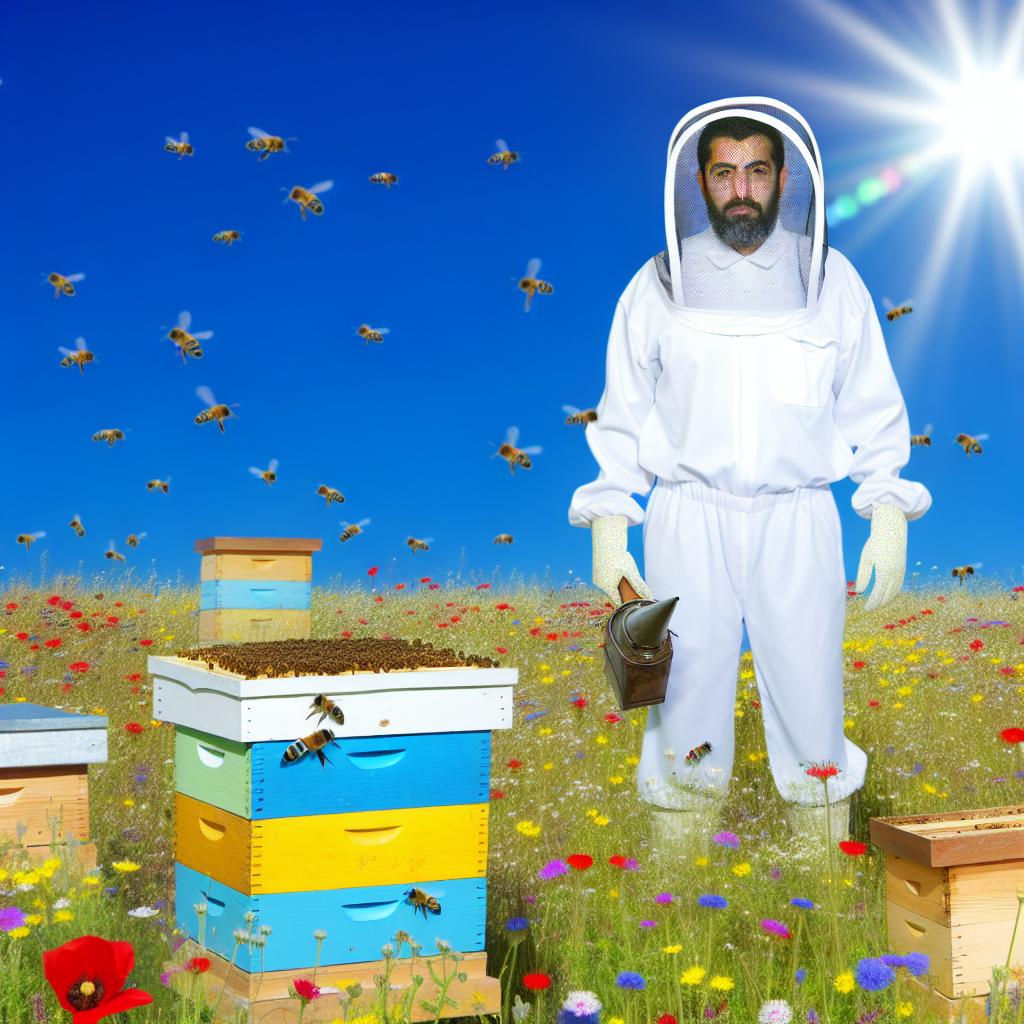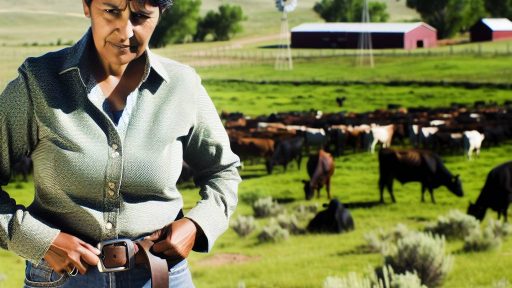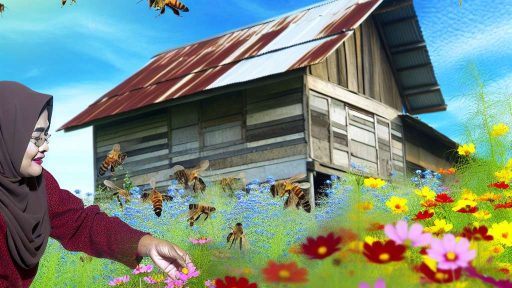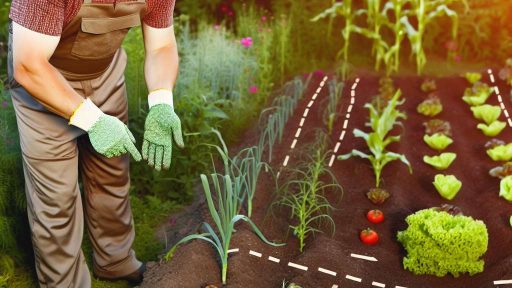Introduction to Beekeeping and its Role in Agriculture
Beekeeping plays a vital role in sustainable agriculture across the USA.
It contributes significantly to crop production by ensuring pollination.
Many farmers rely on healthy bee populations for their livelihoods.
Bees help enhance the yield and quality of various fruits and vegetables.
This symbiotic relationship benefits both farmers and the environment.
The Importance of Pollinators
Pollinators, including bees, are essential for the ecosystem.
They facilitate reproduction in flowering plants through pollination.
Approximately one-third of the food we consume relies on pollination.
Common crops that benefit from bees include almonds, cherries, and blueberries.
Without these pollinators, agricultural productivity would decline significantly.
Supporting Biodiversity
Beekeeping promotes biodiversity within agricultural systems.
Diverse plant life leads to healthier ecosystems.
Bees contribute to the genetic diversity of plants through cross-pollination.
This genetic diversity enhances resilience against pests and diseases.
Therefore, supporting bee populations is crucial for sustainable farming.
Transform Your Agribusiness
Unlock your farm's potential with expert advice tailored to your needs. Get actionable steps that drive real results.
Get StartedEconomic Benefits of Beekeeping
Beekeeping provides economic advantages to farmers and communities.
It creates jobs and generates income through honey and bee product sales.
The beekeeping industry also supports local businesses, including those in agriculture.
Farmers benefit financially from higher crop yields linked to bee pollination.
Moreover, educational programs about beekeeping increase community awareness.
Environmental Impact
Beekeeping has positive impacts on the environment.
It promotes the growth of flowers and plants through effective pollination.
This growth can lead to improved carbon sequestration and soil health.
Bees also help maintain the balance of various ecosystems.
This balance is critical for maintaining a sustainable agricultural landscape.
Challenges Facing Beekeeping
Despite its importance, beekeeping faces several challenges.
Ongoing habitat loss threatens bee populations in many areas.
Pesticide use can have detrimental effects on bee health and behavior.
Moreover, climate change impacts the timing of bloom and bee activity.
Addressing these challenges is essential for sustainable beekeeping practices.
Understanding Pollination
Importance of Bees in Pollination
Bees play a critical role in pollinating crops.
They enhance the genetics of fruits and vegetables.
This process leads to larger yields and better quality produce.
Additionally, bees help maintain biodiversity.
Without bees, many plants would fail to reproduce.
How Pollination Boosts Crop Yields
Pollination directly influences crop productivity.
By transferring pollen, bees ensure effective fertilization.
Crops like almonds, blueberries, and apples depend on bee activity.
As a result, farms report increased yields when bees are present.
Showcase Your Farming Business
Publish your professional farming services profile on our blog for a one-time fee of $200 and reach a dedicated audience of farmers and agribusiness owners.
Publish Your ProfileMoreover, farmers observe a decrease in production costs.
Economic Impact of Bee-Enhanced Pollination
The economic benefits of bee pollination are significant.
Studies show that crop value increases substantially.
This increase can reach billions of dollars annually.
Beekeeping encourages agricultural diversity and sustainability.
Ultimately, it stabilizes farm income and promotes local economies.
Supporting Local Beekeepers
Farmers can foster relationships with local beekeepers.
This collaboration often leads to mutual benefits.
Beekeepers provide pollination services to farms.
In return, farmers ensure a healthy environment for bees.
This partnership is vital for community sustainability.
The Economic Impact of Beekeeping on Local Farmers
Boosting Crop Yields
Beekeeping plays a critical role in enhancing crop yields.
Honeybees pollinate a variety of fruits, vegetables, and nuts.
This process significantly increases the quantity and quality of harvests.
Farmers who utilize bees often see improved profits.
For example, apple orchards can increase production by up to 40% with bee pollination.
Thus, beekeeping directly benefits local farming economies.
Supporting Local Economies
Beekeeping contributes to local economies by creating jobs.
Beekeepers often hire seasonal workers during peak honey harvesting times.
Moreover, local businesses benefit from increased sales of bee-related products.
These products include honey, beeswax, and propolis.
Essentially, beekeeping instills a thriving community market.
Promoting Biodiversity
Beekeeping helps conserve and promote agricultural biodiversity.
By pollinating various plant species, bees maintain healthy ecosystems.
This biodiversity is crucial for resilient food production systems.
Furthermore, diverse crops improve soil health and reduce pest populations.
Farmers thus enjoy a more sustainable farming environment.
Long-term Agricultural Sustainability
Investing in beekeeping supports sustainable farming practices.
Healthy bee populations contribute to the stability of food systems.
This reduces the need for chemical fertilizers and pesticides.
Consequently, it fosters an eco-friendly farming approach.
Farmers who embrace beekeeping often see improved land productivity over time.
Uncover the Details: DIY Garden Projects for Homesteading Beginners
Beekeeping Practices that Support Biodiversity
Pollination Contributions
Beekeeping significantly enhances pollination across diverse crops.
This practice leads to improved fruit and seed production.
Consequently, it boosts the overall health of ecosystems.
Supporting Local Flora
Beekeepers often cultivate diverse flowering plants.
These plants provide essential forage for bees.
As a result, they also support local wildlife and biodiversity.
Organic Beekeeping Methods
Organic beekeeping emphasizes natural practices.
Showcase Your Farming Business
Publish your professional farming services profile on our blog for a one-time fee of $200 and reach a dedicated audience of farmers and agribusiness owners.
Publish Your ProfileThis method avoids synthetic pesticides and fertilizers.
Additionally, it contributes to healthier bee populations.
Healthy bees can pollinate a wider range of plants.
Community Engagement
Beekeeping often encourages community involvement.
Local workshops teach sustainable practices to aspiring beekeepers.
Such initiatives enhance public awareness about biodiversity.
Research and Conservation Efforts
Many beekeepers participate in research programs.
These programs focus on bee health and ecosystem impacts.
Furthermore, conservation efforts aid in protecting native pollinators.
Uncover the Details: Step-By-Step DIY Garden Projects To Enhance Soil Health For Farming In The USA
The Connection Between Beekeeping and Soil Health
The Importance of Pollinators
Beekeeping nurtures vital pollinators in ecosystems.
Bees assist in pollinating a wide variety of crops.
This process directly influences soil health and fertility.
In particular, fruit and vegetable crops benefit greatly from bees.
Moreover, healthy pollination systems enable better crop yield.
Soil Microbial Activity
Bees contribute to maintaining beneficial microbial activity in soil.
Their pollination promotes diverse plant growth.
Diverse plants stimulate a wider range of microorganisms.
These microbes enhance nutrient cycling within the soil.
Furthermore, they improve soil structure and aeration.
Enhancing Biodiversity
Beekeeping encourages agricultural biodiversity on farms.
Biodiversity is crucial for resilient ecosystems.
It supports various insect populations beyond bees.
This enhances natural pest control and reduces chemical use.
Farmers benefit from healthier ecosystems and improved yields.
Reducing Soil Erosion
Pollinated plants stabilize soil through root systems.
This reduces soil erosion, particularly on sloped terrains.
Healthy plant coverage fosters soil retention and integrity.
Moreover, less erosion leads to lower sedimentation in waterways.
Long-term Sustainability
Beekeeping promotes sustainable agricultural practices over time.
Farmers can create more resilient farming systems through bees.
These systems withstand climatic variation and changing conditions.
Ultimately, this leads to a healthier farming future.
You Might Also Like: Small Livestock Management for Profitable Small-Scale Farming
Sustainable Beekeeping Techniques for Healthy Hives
Organic Pest Management
Organic pest management reduces the need for chemical treatments.
This method uses natural predators to control pests.
For instance, lacewings can help manage aphid populations effectively.
Additionally, beekeepers can introduce beneficial nematodes to control larvae.
Ultimately, these practices enhance hive health while protecting the environment.
Regular Hive Inspections
Regular hive inspections ensure beekeepers monitor hive health closely.
Showcase Your Farming Business
Publish your professional farming services profile on our blog for a one-time fee of $200 and reach a dedicated audience of farmers and agribusiness owners.
Publish Your ProfileInspecting hives helps identify signs of disease early.
This proactive approach prevents severe health issues within the colony.
Moreover, it allows beekeepers to evaluate honey production levels.
As a result, timely interventions can support the overall success of the hive.
Planting Pollinator-Friendly Crops
Planting flowers that attract pollinators is essential to sustainable beekeeping.
Diverse blooming plants provide necessary forage for bees.
For example, sunflowers and clover offer high nectar yields.
Such diversity helps maintain healthy bee populations and ecosystems.
Furthermore, farmers can create buffer zones filled with native plants.
Using Natural Beekeeping Practices
Natural beekeeping emphasizes minimal interference with bee behavior.
This method respects the bees’ natural instincts and habitats.
Beekeepers often use foundationless frames to allow bees to build their comb.
Additionally, this practice fosters a more natural hive structure.
Overall, it promotes bee well-being and resilience against diseases.
Community Support Initiatives
Community support helps promote sustainable beekeeping practices.
Local organizations often conduct workshops and training sessions.
These events educate new beekeepers on sustainable techniques.
Moreover, experienced beekeepers share valuable insights and knowledge.
This collaborative approach fosters a sustainable beekeeping community.
You Might Also Like: Essential Tools for Successful Mushroom Cultivation

Challenges Facing Beekeepers in Sustainable Practices
Environmental Threats
Beekeepers encounter various environmental challenges that hinder sustainable practices.
Climate change poses a significant threat to bee populations.
Extreme weather conditions disrupt foraging patterns.
Moreover, habitat loss from urban development decreases available foraging areas.
Pesticide use in agriculture affects bee health and reproduction.
Ultimately, these stressors contribute to declining colony health.
Economic Pressures
Economic factors also challenge beekeeping sustainability.
Low market prices put pressure on beekeepers to minimize costs.
Many beekeepers struggle to cover expenses for adequate bee care.
Consequently, some may sacrifice best practices for short-term profits.
This approach can undermine the long-term viability of bee populations.
Knowledge Gaps and Education
Beekeepers often face knowledge gaps regarding sustainable practices.
A lack of access to resources can limit learning opportunities.
Some beekeepers operate without adequate understanding of bee biology.
This situation can lead to ineffective management techniques.
Furthermore, misinformation about bee health can spread easily.
Regulatory Challenges
Regulatory frameworks can complicate beekeeping efforts.
Inconsistent policies across states create confusion for beekeepers.
Additionally, stringent regulations may limit hive placement.
This can hinder pollination services for local farmers.
Showcase Your Farming Business
Publish your professional farming services profile on our blog for a one-time fee of $200 and reach a dedicated audience of farmers and agribusiness owners.
Publish Your ProfileUltimately, it is vital to advocate for supportive policies for beekeepers.
Case Studies: Successful Integration of Beekeeping in Crop Farming
Enhancing Crop Yields
Beekeeping significantly boosts crop yields in various agricultural sectors.
Farmers report increased production due to the pollination efforts of honeybees.
For instance, apple orchards that incorporate beekeeping show up to 30% higher yields.
This increase can lead to greater profits for farmers, enhancing their sustainability efforts.
Case Study: Sunny Hill Farms
Sunny Hill Farms is a prime example of successful integration of beekeeping.
They manage both honeybees and diverse crops, including zucchini and strawberries.
The farm plants crops that bloom at different times to keep bees active year-round.
As a result, their fruit production rose significantly in just three years.
This approach promotes biodiversity and soil health on their farm.
Pollination Services and Economic Benefits
Beekeeping also provides pollination services that are economically beneficial.
The National Pollinator Partnership estimates pollinators contribute over $15 billion annually.
Farmers like Grace Thompson, who own local farms, utilize bees for pollination.
They understand that healthy bees create healthier crops and better economic returns.
Case Study: Green Fields Eco-Farm
Green Fields Eco-Farm combines organic farming with beekeeping practices.
They noticed a 40% increase in crop production after introducing hives.
Consequently, their strawberries gained popularity at farmers’ markets for superior taste.
This boosted their sales, providing a sustainable income source.
Promoting Biodiversity through Beekeeping
Integrating beekeeping practices promotes biodiversity in agricultural landscapes.
Many farmers introduce wildflower strips to support bee populations.
These strips create habitats for various pollinators, increasing overall diversity.
Moreover, diverse crops improve soil fertility and reduce pest populations naturally.
Case Study: River Valley Agriculture
River Valley Agriculture implements a model focusing on biodiversity and beekeeping.
The farm uses cover crops and flowering plants to sustain bee populations.
As a result, they experienced enhanced pollination across their vegetable crops.
This integrated approach reduces the need for chemical pesticides, promoting sustainability.
Challenges and Solutions
Despite its benefits, beekeeping in agriculture has challenges.
Beekeepers face issues such as colony collapse disorder and pesticide exposure.
However, awareness and education are key to overcoming these challenges.
Farmers can adopt practices that protect bee populations effectively.
Examples of Successful Practices
- Reducing pesticide use during flowering periods.
- Planting diverse cover crops to provide forage.
- Creating buffer zones to separate crops from pesticide applications.
By adopting these strategies, farmers help ensure robust bee populations for sustainable farming.
Future Perspectives: The Role of Beekeeping in Climate Resilience
Beekeeping and Biodiversity
Beekeeping plays a crucial role in enhancing biodiversity across agricultural landscapes.
Bees pollinate a wide variety of plants, which supports diverse ecosystems.
This biodiversity is vital for building resilience against climate change.
Effects of Climate Change on Bees
Climate change poses significant threats to bee populations throughout the United States.
Rising temperatures and changing precipitation patterns disrupt bee habitats.
These changes can diminish food sources and nesting sites for bees.
Beekeeping as a Mitigation Strategy
Emphasizing beekeeping can serve as an effective strategy to combat climate impacts.
Farmers can enhance pollination services by incorporating beekeeping practices.
Stronger pollination boosts crop yields and promotes food security.
Showcase Your Farming Business
Publish your professional farming services profile on our blog for a one-time fee of $200 and reach a dedicated audience of farmers and agribusiness owners.
Publish Your ProfileMoreover, beekeeping fosters the establishment of adaptive agricultural systems.
Community Engagement and Education
Educational programs on beekeeping can increase community involvement in sustainable practices.
These programs encourage local food production and environmental stewardship.
Additionally, they raise awareness about the importance of pollinators for ecosystem health.
Research and Innovation
Investing in research on bee health and climate adaptation can yield crucial insights.
Innovations in beekeeping technology can improve hive management and monitoring.
These advancements help beekeepers respond effectively to climate challenges.
Policy and Support
Policies that support beekeeping are essential for sustainable agricultural practices.
Government incentives can promote beekeeping as part of climate resilience strategies.
Moreover, collaboration among farmers, researchers, and nonprofits is vital.
Additional Resources
Dr Leo Sharashkin Bio | Natural Beekeeping | Horizontal Hives




